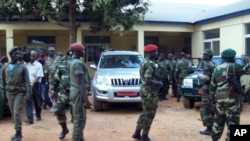In Guinea-Bissau, coup leaders have told the country's political leaders to begin forming a military-backed transitional "government of unity." This move came less than 48 hours after soldiers seized power and arrested the interim president and his opponent, who were about to begin campaigning for a runoff election later this month. The future of Guinea-Bissau, one of the most unstable countries in West Africa, remains as uncertain as ever.
Army chiefs told political leaders in Guinea-Bissau to begin discussions about forming a transitional government. Soldiers seized power late Thursday in a move they said was designed to prevent Angolan forces from attacking the nation's military. In a statement issued Friday, coup leaders said there was an alleged secret agreement with Angola.
Party leaders are meeting after the military ordered them to form an interim government. Among those attending the talks in Bissau is opposition party leader Kumba Yala, who was due to take on former Prime Minister Carlos Gomes Junior in a second round presidential poll later this month. Gomes and interim President Raimundo Pereira were seized by soldiers late Thursday.
Military chiefs set out conditions for what they call the "transitional unity government."
The cheifs said they will play a part in the new administration and will control the ministries of defense and interior.
They also said that Gomes and Pereira are both well. The two men are being held by the army.
VOA's reporter in Bissau says a relative calm has returned to the streets of the city and that markets are open. Soldiers, he says, have left the streets. But private radio stations have been taken off air or told to play music instead of reading news stories.
The coup has not garnered much popular support, he says, and many people are confused as to who is in control of the country.
Just days before the coup, Angola had announced that it was ending a $30 million security sector reform mission to Guinea-Bissau.
A second-round presidential poll had been scheduled for April 29. But second-place finisher Yala, who is known for his close ties with the military, had pledged to boycott the second round after alleging that the first round was rigged.
Guinea-Bissau has been struck by repeated coups, counter-coups and assassinations since independence from Portugal in 1974. Fierce rivalries have marred the relationship between the military and the government since then. No elected president has finished his mandate since 1994.
The United Nations Security Council, the African Union and Regional bloc ECOWAS have condemned the coup, which is the second to hit West Africa in recent weeks. Mutinous soldiers seized power in Mali on March 22.









